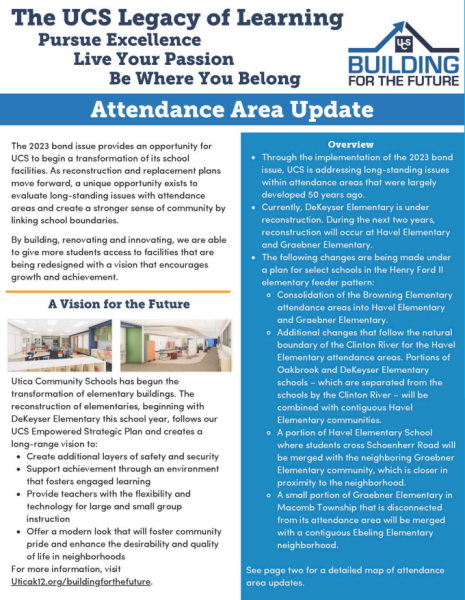Drunk, distracted, drugged driving
Almost everyone makes distracted driving choices, but no one admits it.
At any given moment, about 660,000 drivers are using electronics while they drive, according to ncconsumer.org. This month, there will be about 2.4 million incidents where high school teens drive after drinking, according to cdc.gov. And the end of the year, about 10 million people will drive under the influence of illicit drugs, according to the National Survey on Drug Use and Health.
Distracted driving is anything that takes the attention of the driver away from what they’re supposed to be focused on, according to Jim Malczewski, Shelby Township police department detective and UCS Liaison officer.
“Many forces that we aren’t aware of influence our decisions. During the teen years, the brain’s reward centers are very easily aroused, pulling us toward things we think will be pleasurable—even if risky; and this often overpowers our better judgment,” said Laurence Steinberg, professor of psychology at Temple University.
Not only do teenage drivers lack experience, but they are also highly susceptible to peer pressure. The pressure can then lead to drug or alcohol related incidents while the teen is behind the wheel, according to drivingskillsforlife.com.
Drugs are a widely underestimated distraction while driving. The problem with marijuana, or THC, is while the effects are diminished after a short period of time, but the drug can actually be in a user’s system for up to 30 days after they use it, according to security specialist Victor Patrone. Second only to alcohol, marijuana is the most common drug found in the blood of accident drivers, according to drugabuse.gov. Drugs both physically and mentally impair drivers, even if they do not feel the effects.
“Drugs and alcohol affect people in all different ways, but it doesn’t matter. If you’re under the influence and you get stopped by the police officer, they can choose to do a blood draw or they can do a sobriety check or preliminary breath test. Both of these test for alcohol or marijuana in the system,” Malczewski said. “Whether you can handle it or you cannot, if drugs or alcohol are in your system and you’re behind the wheel, you will get arrested and charged. So it doesn’t matter if you think you can handle it, it’s just against the law.”
Although drugs are a prevalent distraction, texting is currently the biggest driving distraction amongst teenagers, according to Patrone. The average time people take their eyes off the road while texting is about five seconds; so if driving at 50 MPH, that’s enough time to cover the length of a football field, according to Virginia Tech Transportation Institute.
Teenagers constantly struggle to resist the urge to pick up their phones and respond while they are driving more so now than ever before. This is largely due to the rise in dependency on phones and the amount of teens that own them. About 75 percent of 12-17 year-olds now own cell phones, up from 45 percent in 2004, according to pewinternet.org. In a recent study, 94 percent of teen drivers acknowledged the dangers of texting and driving, but 35 percent admitted to doing it anyway, according to an AAA poll.
“There is nothing that is that important that can’t wait five minutes until you get to a stoplight or to where you are going. Just because it beeps, doesn’t mean you have to look at it right there and then,” Patrone said.
An endless amount of criminal charges can come along with texting, drinking or acting under the influence of drugs while driving.
“If you are left of the center line or you’re swerving or speeding because you aren’t paying attention, you can be charged with reckless driving. This gives you six points and roughly $300 in fines, your insurance will go up, and once you reach 12 points, you lose your license,” Malczewski said. “Most officers I know are doing a big crack down on texting and driving or using your cell phone while driving, so I don’t think there are many breaks given from the officers anymore.”
Not only do people have to deal with the criminal repercussions of their actions, but they must cope with the mental effects of their mistakes. Many people will recover, even from severe road crashes; but up to 30 percent of people will have a negative psychological response to overcome, according to rms.nsw.gov.au.
“Depending on how reckless the decision is, you can be charged with a very serious crime—even as an adolescent. I was an expert in a case in which a 16-year-old was texting while driving and had a head on collision with someone who died as a result. He was sentenced to prison for a minimum of five years,” Steinberg said.
It’s not just the driver that is endangered, it’s everyone on the roads with them as well.
A female junior student wishing to remain anonymous for personal reasons said, “Driving is a privilege, and distracted driving is one of the stupidest things anyone can do. You should always be alert, because it only takes one second to end someone’s life and no one wants to experience the pain of losing or injuring someone.”
Although it’s impossible to predict others, actions, there are several steps that one can take to protect themselves. Some of the best ways to stay safe are wearing a seatbelt at all times, driving the speed limit, looking both ways before passing through a green light and making sure to limit distractions in the car, according to Malczewski.
“Put all the technology away and keep the number of people in your car to a minimum,” Patrone said. “You need to be safe out there. It’s a crazy world, there’s crazy drivers, don’t put yourself in the position that you’re part of the problem.”
Your donation will support the student journalists of Eisenhower High School. Your contribution will allow us to purchase equipment and cover our annual website hosting costs.




![Bringing an idea to life, senior sculpture student Braden Williams begins construction on a book-based sculpture. The sculpture concept revolves around fortune telling, which Williams will evoke with a head sculpt, sporting a third eye. “It's [the eye] a bigger focus on that face. It's the main focus. Gotta put a lot of detail into that,” Williams said.](https://ikenews.com/wp-content/uploads/2025/04/IMG_3413-1-600x481.jpg)